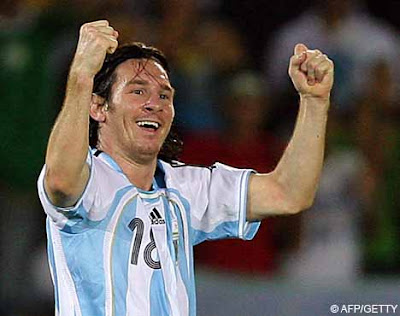 |
| Lionel Messi has all the qualities to take world by storm. |
Long before the young man turned Stamford Bridge into his own personal theatre this week, Jose Mourinho knew all about Leo Messi. In 2003 the floppy-haired 16-year-old made his first senior appearance for Barcelona on the night the Catalan squad travelled to Porto, where they provided the opposition at the ceremonial opening of the spectacular new Dragao Stadium. Mourinho, who had just led the Portuguese club to the first of two consecutive league championships, received at close quarters a glimpse of a talent that would come back to plague him.
And it only takes a glimpse to see what makes Messi so remarkable. He may look like the missing fifth member of the Monkees but, as with all great players, his signature is in his silhouette and his movement. Even when he stands still, he is leaning forward. His head is always up, like a gun dog on the scent. He covers the ground fast, a low centre of gravity making him hard to knock off the ball, angling his runs to take him towards goal by the shortest route. Only three minutes had gone on Wednesday night when he cut inside Claude Makelele and hit a left-footed drive that forced a fumble from Petr Cech. And already, at 18, he possesses the tradecraft that enabled him to turn Asier del Horno's stupid foul into a fatal error.
A year after his trip to Porto, Messi became the third-youngest player to represent Barcelona when he was given his competitive debut in the local derby against Espanyol. After that, things happened fast. Against Albacete on May 1 2005 he became the youngest player to score a goal for the club. That June, wearing Argentina's colours, he was voted player of the tournament, ahead of Jon Obi Mikel, in the under-20 World Cup, after his pair of penalties had secured a win in the final over Mikel's Nigeria.
When he got back to Barcelona it was to sign a deal extending his contract to 2014, with a sell-on clause valuing him at an astonishing €150m (£102m). And that August he was given his first senior international cap by José Pekerman, his national team manager, who sent him on as a substitute in a friendly against Hungary in Budapest and saw the boy dismissed after only three minutes for reacting to a clumsy challenge with a swing of an arm.
Diego Maradona, too, had made his international debut against Hungary, and already comparisons were being made between the two. They were reinforced on Wednesday when an English audience saw for itself how Messi, only 5ft 7in tall but sturdily built, has a similar gift for what Argentinians called the gambeta: that sinuous high-speed dribble that carried Maradona to his famous second goal against England in Mexico 20 years ago.
If Maradona inherited the technique from the great Omar Sivori, he appears to have passed it on to a teenager who may well steal the headlines from Wayne Rooney, Robinho and other prodigies in Germany this summer. And after Wednesday night, few can remain unaware of how perfectly that gift is being blended with Ronaldinho's unpredictability, Samuel Eto'o's cool finishing and Deco's tireless construction work as Barcelona head for a second consecutive title in La Liga.
Lionel Andres Messi was born in the city of Rosario in Sante Fe province, the birthplace of Che Guevara. At the age of five he was playing for his first club, Grandoli, coached by his father, Jorge. In 1995 he joined Newell's Old Boys, Rosario's second club, where Maradona himself had briefly played a year earlier while getting himself fit for his final ill-starred appearance in a World Cup.
Maradona had been turned from a slender child into a young bull through the early administration of steroids. The young Messi, similarly, was considered too small, but his lack of growth was attributed to a hormonal deficiency in his bones, a condition requiring treatment costing more than £500 a month. River Plate, one of Argentina's great clubs, showed a persistent interest in his progress, but this was a time when the country's economy was collapsing and it was Barcelona who offered to take care of the medical bills if the 13-year-old would agree to start a new life across the Atlantic.
For three years Barcelona nurtured the boy as he progressed through their junior teams at record speed, and now they are benefiting from their foresight. Off the pitch Messi is said to be a quiet, placid character who shows no interest in acquiring the kind of dangerous habits that so frequently derailed the career of the last of his compatriots to have been acclaimed as the world's greatest player. If it is Messi's destiny to achieve a comparable pre-eminence, it looks as though he will greet it with an enviable serenity.
0 comments:
Post a Comment